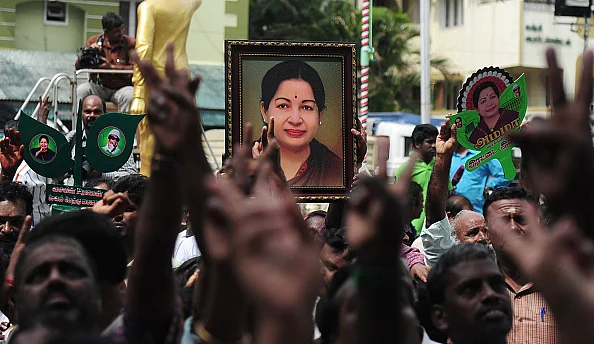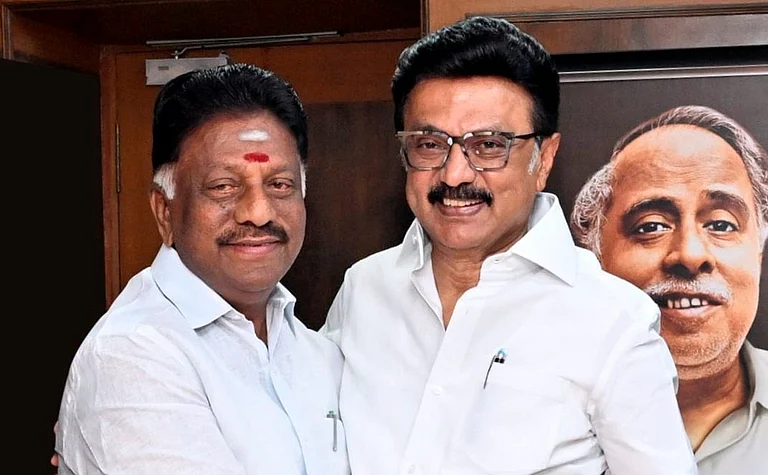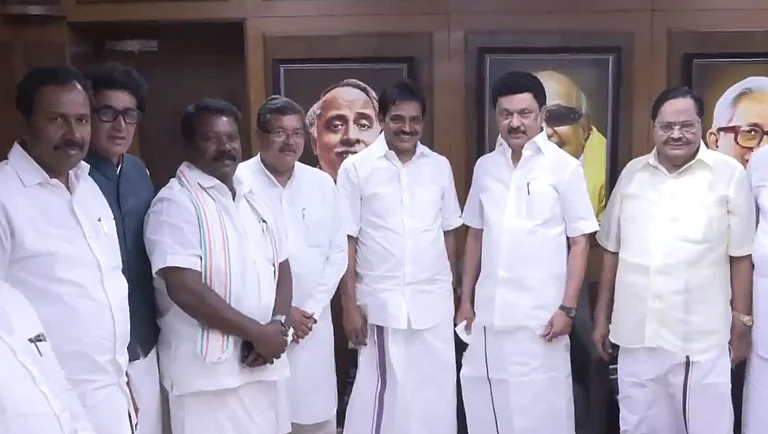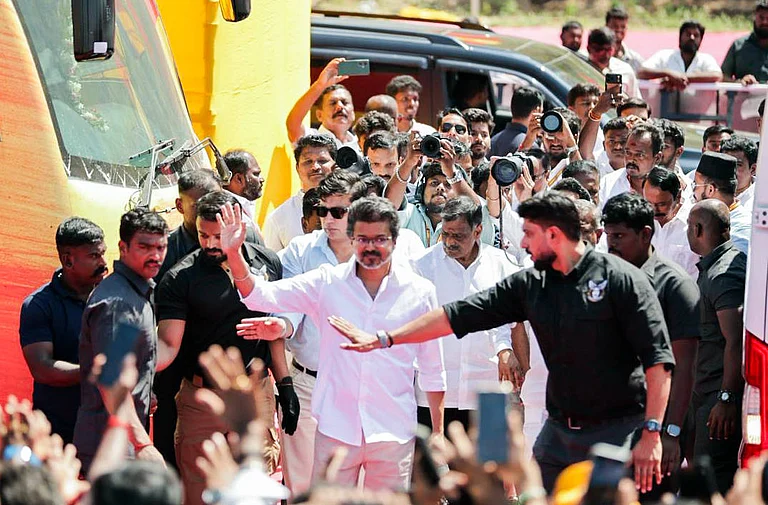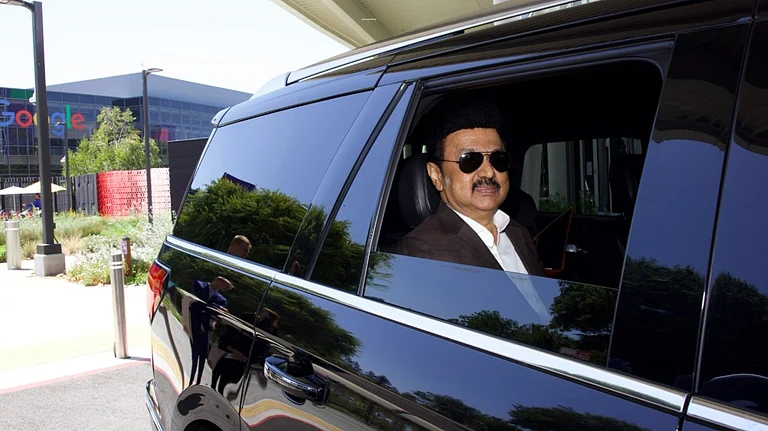After months of internal dispute in the Dravida Munnetra Kazhagam (DMK), on a rainy day in 1972, M. Karunanidhi finally expelled M.G. Ramachandran (M.G.R) for asking for an account of the expenditure of the party.
Accusing of growing corruption within the DMK after the demise of C.N Annadurai, Ramachandran formed Anna Dravida Munnetra Kazhagam (ADMK) on October 17, 1972, and later on renamed it All India Anna Dravida Munnetra Kazhagam (AIADMK).
Dravidian, Left, Centre, and Right: All About Ideology and Electoral Performance
The party emerged with Dravidian Politics but M.G.R considered the ideology of the party as ‘Annaism’, after the ideology of Annadurai based on Socialism and Secularism. Along with its party, M.G.R often supported parties like the All-India Forward Bloc (AIFB), and the Indian Union Muslim League (IUML). In the assembly elections of 1977, AIADMK was in alliance with the Communist Party of India (Marxist), but also the party did not deploy any candidate in the Usilampatti Constituency to support the Forward Bloc leader P.K. Mookiah Devar. In the same elections, it also supported M. Abdul Latheef, the IUML candidate in the Vaniyambadi Constituency.
In 1977, the AIADMK and the alliance won the election with a big number of 144 out of 234. M.G.R. became the chief minister for the first time but this was not the end. The government fell in just 2 years and 232 days, just after the coalition of DMK - Congress won the general elections of 1980. Substantially, the DMK pushed the Congress-led central government to dismiss the AIADMK government alleging that the people lost their faith in M.G.R. (A similar tactic used by M.G.R. to make the DMK-led state government fall in 1976).
Soon after The Communist Party of India which was with DMK until the last elections also joined the AIADMK alliance. The legislative elections of 1980 took place and the AIADMK alliance won 162 seats. M.G.R. became the Chief Minister for the second time and remained in the seat of state until his death on December 24, 1987.
The death of M.G.R. brought a deep fall for the AIADMK. The party was divided into two factions. One with Janaki, the wife of M.G.R., and another with J. Jayalalitha (an actress whom M.G.R. brought into politics a few years back). In the assembly elections of 1989, both factions contested the elections independently and they collectively won only 29 seats. Jayalalithaa’s faction won 27 seats, and Janaki’s faction won a mere 2 seats. V. N. Janaki Ramachandran lost the seat of Andipatti to DMK’s P. Asayan.
The DMK with its allies (including CPIM) formed the government in 1989 and Karunanidhi became the Chief Minister after completing almost 13 years, far from the seat of state. But when the government completed its 2 years, it was dismissed by the then Prime Minister Chandra Sekhar using article 356 of the Indian constitution.
In the 1991 elections, the state of Tamil Nadu saw the grand magic of the cult status of J. Jayalalithaa. The AIADMK with its allies (including Congress) won 225 out of the 234 seats. Jayalalithaa became the Chief Minister for the first time and remained in power until the next election in 1996.
The 1996 election again brought a huge fall for the party as the alliance of AIADMK won just 4 seats. Karunanidhi again became CM for the next five years. In the very next elections of 2001, the alliance of AIADMK (including CPI, CPIM, INC) won 196 seats. This political tug-of-war between DMK and AIDMK again happened in 2006 when Karunanidhi became the Chief Minister for the fifth time.
In 2006, AIADMK and its allies came to power with 203 seats, since then till 2021, AIADMK was in power until M.K Stalin of the DMK won the election with 133 seats and became the new Chief Minister.
The party that was founded on the principles of Dravidian ideology, championed by leaders like M.G.R and Jayalalithaa, witnessed a huge internal power struggle that led to ideological fragmentation. Factionalism and opportunism became more renowned with different factions of the party aligning with different ideologies. Some factions leaned towards aligning with the Bharatiya Janata Party (BJP) of the center, adopting a nationalist and Hindutva-leaning stance.
The Cult and the Charisma
AIADMK, from its initial days, has been deeply intertwined with the cult of its founder M.G.R.
He, himself was an actor-turned-politician whose charisma played an influential role in shaping the party’s identity and electoral success. He mobilised the masses between 1972 and 1977 to spread and preach his party ambition with films like Netru Indru Naalai (1974), Idhayakani (1975), Indru Pol Endrum Vazhga (1977), etc.
Similarly, Jayalalithaa, M.G.R.’s successor, made a charismatic appeal that transcended traditional political boundaries, garnering unwavering loyalty from millions of followers who even made temples to worship her.
Following M.G.R.’s passing in 1987, she stepped into his shoes, inheriting not only his party, political legacy, and ideology but also his cult of personality. Known as the “AMMA” (Mother) of the state, she commanded immense respect from her followers, who viewed her as a symbol of strength and resilience.
The leadership style of M.G.R and Jayalalithaa, often characterized by a combination of authoritarianism and benevolence, engendered a sense of loyalty and devotion among cadres and supporters.







